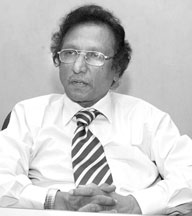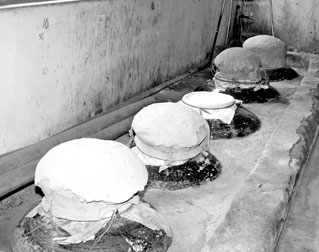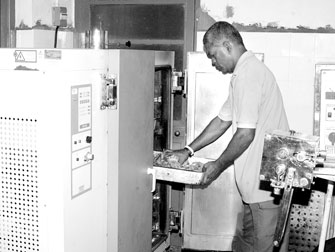|
CMC opens ancient medicine department:
Ayurveda to the rescue
By Ranil WIJAYAPALA
 |
|
Dr. Palathiratna |
Rows of huge Egyptian made jars and pots sealed with ant hills and
pot clay and buried under clay floors gives someone entering that place
an impression of entering a place with archaic values despite it being
within the busy and thickly populated Dematagoda area in the Colombo
city.
The ancient looking burners and underground hearths used for metal
ashing and the huge cauldrons used to boil kasaya add to the same
feeling of ancient value.
But the pump lines and bottling machines by the side of those jars
and pots indicate that it was a place where the ancient and modern
technology combined.
The Ayurvedic Drug Manufacturing Centre at Dematagoda run by the
Indigenous Medicine Department of the Colombo Municipal Council
manufactures Ayurvedic drugs to be distributed among 20 Ayurvedic and
Indigenous Medicine Dispensaries within the Colombo city.
But the most important factor is that it is the only place where the
ancient technique of underground fermentation method of manufacturing
Ayurvedic drugs is being used at present in Sri Lanka.
"This underground technique was used in ancient times. We believe
that the pioneer of that system was King Ravana and of our Ayurveda
medicinal system. We are preserving that system here in our drug
manufacturing centre", explaining the system used there, Dr. C.D.
Palathiratna, the Chief Medical Officer of the Indigenous Medicine
Department of the Colombo Municipal Council said.
A great physician
According to the epic Ramayana, King Ravana is said to have been well
versed in medical knowledge. He sent his most trustworthy wiseman,
Pulathisi Rishi, to represent Lanka at the world's first medical
conference held in the Himalayas in India. According to Dr. Palathiratna,
even though historians claim King Ravana is mythical, the Sri Lankan
indigenous medical practitioners believe in the existence of the king
adding that he was a great physician who had authored five books on
medicine. Arkaprakash, one of the five books in a later edition is
available in Sanskrit even today.
"The technology used here is called the underground fermentation
method. That system is not used anywhere else in Sri Lanka.
We prepare herbal wines 'Arishta' and 'Asava' through this
technique", Dr. Palathiratna said.
"We also use the ancient ashing technique in our drug manufacturing
to melt heavy metals to produce asava and arishta", he said.
That ancient technology is being used to burn heavy metals, specially
metals such as mercury, sulphur, gold and those important for very
essential medicines.
Since the setting up of the Indigenous Medicine Department in 1957,
the Colombo Municipal Council Indigenous Medicine Department is using
this ancient technology.
"Herbal wine is usually prepared using the underground fermentation
technique. If you keep it in a normal place, fermentation occurs.
But here it is much better because the underground heat and cold
balance affect this medicine. We used ant clay to cover the mouth and
specially made Egyptian jars placed underground for this fermentation
process", he said.
The Arishta made out of 'Kasaya' using herbal plants and 'Asava' use
of the herbals and sugar are kept for 28 days for underground
fermentation.
Whilst preserving this ancient technology of underground
fermentation, the latest technology has been introduced to make these
Ayurvedic drugs.
Modern methods
"We have introduced the most modern sterilisation methods, to this
drug manufacturing process. Therefore, all medicines are being prepared
with this ancient technology.
 |
|
Underground
fermentation process |
We also apply modern technology to sterilise the bottles and for the
cleaning and sealing of the bottles", Dr. Palathiratna said.
From the underground jars these medicines are filled into the bottles
through the filters.
"When we were using underground technique earlier we had to use
little baskets and other utensils to take out the arishta and asava. By
using the modern technology we have to avoid the contamination of these
medicinal drugs", Dr. Palathiratna said.
"We have maintained very good quality standards when producing these
drugs. We have used modern technology to preserve the ancient
technology. Otherwise we cannot use this ancient technology as people
may think that we are using contaminated drugs when we are using the
ancient technology without using the modern technology for sterilisation
and bottling of drugs", he said.
The Ayurvedic drugs including oils, arishta asava, herbal powders
produced here at the Ayurvedic Drug Manufacturing Centre in Dematagoda,
are being distributed among the 20 Indigenous Medicine Dispensaries in
the city.
The manufacturing of these Ayurvedic drugs is being done under the
supervision of four qualified Ayurvedic doctors and 15 staff.
According to Dr. Pathmashanthi, the Deputy Chief Medical Officer of
the Indigenous Medicine Department of the CMC, they produce more than 90
percent of the requirement of the Ayurvedic dispensaries in the Colombo
city.
"We are maintaining the quality of the drugs and we are maintaining
additional stocks to cater to the demand", Dr. Pathmashanthi said.
According to Pathmashanthi, there is a big demand for the services
rendered by the Ayurvedic Dispensaries.
Specialised centres
The 'Panchakarma Ayurvedic Treatment Centre' at Duplication Road,
Kollupitiya and the Deformity Rehabilitation Indigenous Medical Clinic
for Heroes at Slave Island are specialised Ayurvedic Medicine Centres
run by the Colombo Municipal Council.
"We treat diabetic patients, people with high cholesterol level,
arthritis patients, paralysed people and also patients with chronic
nerve disorders under the indigenous system," Dr. Palathiratne said.
"Western scientists have no such effective methodology for these
nerve disorders. They have it in acute stages. But when paralysis occurs
we use oil massage, special treatment, body massaging at the Panchakarma
centres.
Kingsley Cooray of Wellawatte, thanked the doctors at the Panchakarma
centre for healing his knee pains and his high blood sugar level.
"I took western medicine for it. But when I used the tablet my blood
sugar level shot up to more than 400 points. Then they wanted to remove
water from my knee. I could not walk. My weight was around 97 kgs when I
came here. The doctors here reduced my weight to 80 kgs, control the
diabetic level and also cured my knee pains", Cooray said.
 |
|
Drying herbs using
heaters |
The Panchakarma centre is open to the public seven days except Poya
days for the treatment of patients in need of special treatment. Dr.
Palathiratne said that they are unable to cater to the demand at the
Panchakarma centre. "We are doing it free for the city's ratepayers", he
said. Dr. Sunethra Wickremasinghe at the Deformity Rehabilitation
Indigenous Medical Clinic in Slave Island, said that their objective was
to render whatever possible service for the injured and disabled war
heroes through Ayurvedic medicine.
Ayurveda better
"Although they use western medicine for their injuries they also
accept that the healing from the Ayurvedic system is much better. Many
injured and deformed war heroes come here for treatment", Dr.
Wickremasinghe said.
The Chief Medical Officer Dr. Palathiratne said the Special
Commissioner of the CMC Omar Kamil is giving his fullest support to
promote Ayurvedic dispensaries in the city and the latest Ayurvedic
Dispensary is now being built at Keselwatte and will be opened soon.
"Special Commissioner Omar Kamil gives all support for the Ayurveda
Department. This is the dawn of a new era in the Ayurvedic Department of
the Colombo Municipal Council. This year alone two new Ayurvedic
Dispensaries are being set up. Drug Manufacturing is done at a cost of
Rs. 7 million under Special Commissioner Omar Kamil", Dr. Palathiratna
said. More people in the city will be healed at these Ayurvedic
Dispensaries as the demand for their service is growing.
|

